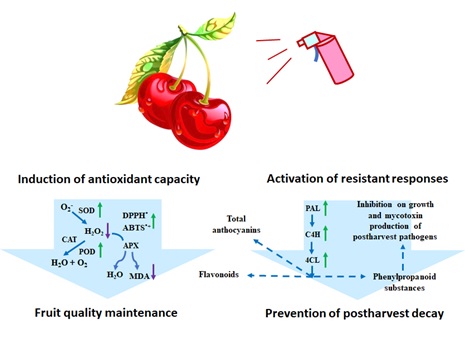Fruit provide abundant dietary fibers, vitamins and other health-promoting metabolites, thereby composing an indispensable part in our daily diets. However, owing to the high sugar and water content, they are prone to quality deterioration and postharvest decay.
Although commercial fungicides are efficient for controlling fungal diseases, they may lead to issues of environmental contamination and food security, which has arisen public concerns. Therefore, safe and efficient strategies for simultaneously regulating fruit quality and resistance to fungal pathogens are in great demand.
A research group from the Institute of Botany, Chinese Academy of Sciences (IBCAS) identified luteolin, a flavonoid substance, from bamboo leaves, and further analyzed its efficacy in maintaining fruit quality and inhibiting postharvest decay in sweet cherry.
The study was published in Food Chemistry recently.
The researchers found that luteolin efficiently maintained better organoleptic quality and alleviated disease severity on harvested sweet cherries during storage. Phenylpropanoid metabolism produces a series of important secondary metabolites from the intermediates of the shikimate pathway in plants.
Further cytological and biochemical assays revealed that luteolin activated the key enzymes in phenylpropanoid metabolic pathway and substantially improved general antioxidative capacity, thereby elevating total anthocyanin and flavonoid contents in sweet cherry.
Notably, luteolin also inhibited mycelial growth of two important postharvest pathogens (Botrytis cinerea and Penicillium expansum) and reduced patulin yield by P. expansum, thus reducing the incidence rate of fungal diseases and potential mycotoxin contamination in the food chain.
“Although plant-derived flavonoids have been reported for health-promoting benefits, their roles in the maintenance of fruit quality remains largely unexplored. These results suggest that luteolin is a promising alternative for maintaining better fruit quality, ameliorating fungal pathogen resistance and reducing mycotoxin production from pathogens”. Said by Dr. Tong Chen, the corresponding author from IBCAS. “Our ultimate goal is to provide delicious and safe fruit for consumers, and thus it is crucial to activate intrinsic antioxidative capacity and resistant responses of fresh fruit for maintaining high fruit quality”

Exogenous luteolin application induces antioxidant capacity and activate resistant responses of sweet cherries
Article Link:https://www.sciencedirect.com/science/article/pii/S0308814620321713?via%3Dihub
Contact:
Email: chentong@ibcas.ac.cn
Institute of Botany, Chinese Academy of Sciences
Fruit provide abundant dietary fibers, vitamins and other health-promoting metabolites, thereby composing an indispensable part in our daily diets. However, owing to the high sugar and water content, they are prone to quality deterioration and postharvest decay.
Although commercial fungicides are efficient for controlling fungal diseases, they may lead to issues of environmental contamination and food security, which has arisen public concerns. Therefore, safe and efficient strategies for simultaneously regulating fruit quality and resistance to fungal pathogens are in great demand.
A research group from the Institute of Botany, Chinese Academy of Sciences (IBCAS) identified luteolin, a flavonoid substance, from bamboo leaves, and further analyzed its efficacy in maintaining fruit quality and inhibiting postharvest decay in sweet cherry.
The study was published in Food Chemistry recently.
The researchers found that luteolin efficiently maintained better organoleptic quality and alleviated disease severity on harvested sweet cherries during storage. Phenylpropanoid metabolism produces a series of important secondary metabolites from the intermediates of the shikimate pathway in plants.
Further cytological and biochemical assays revealed that luteolin activated the key enzymes in phenylpropanoid metabolic pathway and substantially improved general antioxidative capacity, thereby elevating total anthocyanin and flavonoid contents in sweet cherry.
Notably, luteolin also inhibited mycelial growth of two important postharvest pathogens (Botrytis cinerea and Penicillium expansum) and reduced patulin yield by P. expansum, thus reducing the incidence rate of fungal diseases and potential mycotoxin contamination in the food chain.
“Although plant-derived flavonoids have been reported for health-promoting benefits, their roles in the maintenance of fruit quality remains largely unexplored. These results suggest that luteolin is a promising alternative for maintaining better fruit quality, ameliorating fungal pathogen resistance and reducing mycotoxin production from pathogens”. Said by Dr. Tong Chen, the corresponding author from IBCAS. “Our ultimate goal is to provide delicious and safe fruit for consumers, and thus it is crucial to activate intrinsic antioxidative capacity and resistant responses of fresh fruit for maintaining high fruit quality”

Exogenous luteolin application induces antioxidant capacity and activate resistant responses of sweet cherries
Article Link:https://www.sciencedirect.com/science/article/pii/S0308814620321713?via%3Dihub
Contact:
Email: chentong@ibcas.ac.cn
Institute of Botany, Chinese Academy of Sciences
